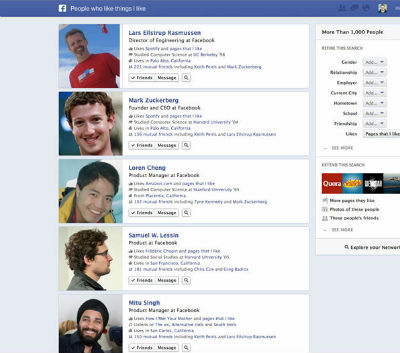Facebook Graph Search Rolls Out To Lucky Few

Facebook revamps its search engine but says it is not a web search replacement
Facebook has unveiled Graph Search, a new social search engine that allows users to search through content shared by friends or made publicly available by other Facebook users.
The beta version of the service will be rolled out to a number of users from today and will focus on four specific areas of content – people, photos, places and interests.
Speaking at the launch event in California, Facebook founder and CEO Mark Zuckerberg called Graph Search the “coolest things we’ve done in a while”, but insisted that it was not meant to replace traditional web search services.
Facebook Graph Search
 Facebook Graph Search allows users to find relevant content on the site by returning answers to questions such as “who are my friends that live in London”, “photos taken in national parks before 1990” or “pubs in Dublin liked by people from Dublin.”
Facebook Graph Search allows users to find relevant content on the site by returning answers to questions such as “who are my friends that live in London”, “photos taken in national parks before 1990” or “pubs in Dublin liked by people from Dublin.”
Search results are ranked according to criteria such as relationships, mutual friends, number of comments or likes. Facebook says that Graph Search can be used to find restaurants, new television shows and even prospective employees. Other potential uses include finding a friend of a friend that speaks a certain language for translation purposes or even finding out what type of music people who like Barack Obama listen to.
Facebook stressed that users will be only be able to see content they are entitled to see and that search results would be unique to each user, even if they had identical friend lists. The social network said for the first time, users would be able to set their privacy settings in bulk.
Business proposition
 Zuckeberg said that although it was confident that Facebook had made enough progress with Graph Search, it planned to roll the service out very slowly so that it could see how users take advantage of it. He added that although the beta release focused on just four areas of content, it planned to add other data such as wall posts, but said it would take time.
Zuckeberg said that although it was confident that Facebook had made enough progress with Graph Search, it planned to roll the service out very slowly so that it could see how users take advantage of it. He added that although the beta release focused on just four areas of content, it planned to add other data such as wall posts, but said it would take time.
“Graph Search is a really big project,” he said. “It’s going to take years and years to index the whole graph.”
If no Facebook searches are returned, then users are shown results from Microsoft’s Bing search engine, but Zuckerberg said that the company didn’t expect people to use Facebook as a web search service.
“Graph Search is not web search,” the Facebook founder stated. “We are not indexing the web.”
Targeted advertising
He added that although the primary motive behind Graph Search was to offer a new experience to users, it could eventually become a business proposition. Analysts appear to agree with Zuckeberg, suggesting that Graph Search could be used for more targeted advertising.
“Before the arrival of Facebook’s Graph Search, the search function on Facebook was basic and as such, a wasted opportunity given Facebook’s imperative to strengthen advertising revenues,” said Eden Zoller, principal analyst at Ovum. “Facebook Graph Search will no doubt leverage member data to provide advertisers with more targeted, personalised advertising opportunities going forward. But Facebook needs tread very carefully here and be mindful of user privacy. It claims to have built Graph Search with privacy in mind, but Facebook has a mixed track record on this front and is in the habit of pushing privacy to the limits of what is acceptable.”
“Facebook Graph Search is not a web search engine, but a search tool designed to enrich the Facebook platform and experience for both users and advertisers,” he added. “This is sensible as a full blown web search engine from Facebook would inevitably have to compete with Google search, and given Google’s dominance of the search market it would be hard for Facebook to make a serious impact – and win advertising dollars.”
What do you know about Facebook? Find out with our quiz!